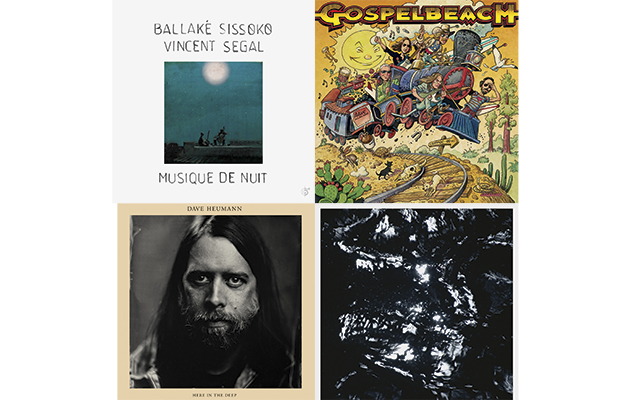One band that have kept me pretty well sustained these past few years have been Baltimore’s Arbouretum, along with frontman Dave Heumann’s auxiliary projects like Human Bell and Coil Sea. Among a bunch of fine records being released in the next few weeks, there’s “Here In The Deep”, ostensibly Heumann’s first solo album.
For all their heavy psychedelic groupthink, Arbouretum have often looked from a distance like a vehicle for Heumann’s own vision, and the correlation between
“Here In The Deep” and what has preceded it implicitly confirms as much. Arbouretum’s thicker drones are sometimes replaced by more dappled textures that privilege the folk-rock formalism that has long underpinned much of Heumann’s music, with the lovely “Ides Of Summer” chiming in a way reminiscent of REM’s “Green Grow The Rushes”.
An incantatory churn through the traditional “Greenwood Side”, though, would’ve sat neatly enough on Arbouretum’s last set, “Coming Out Of The Fog” (2013). And it’s fitting that the album pivots on a ruminative jam, “Ends Of The Earth”, on which Heumann, in elevated Richard Thompson-esque form, is joined by his regular bandmates.
Moving on, Brent Rademaker’s diligent preservation of a certain LA country-rock sound has seen him pilot some handy groups, notably The Beachwood Sparks. The typographically awkward GospelbeacH is Rademaker’s latest band, and one which stays true to the aesthetic that’s sustained him for around two decades. Gram love proliferates, then, along with a hint of early ’70s Grateful Dead – due, perhaps, to the presence of guitarist Neal Casal (away from the Chris Robinson Brotherhood, he composed interval music for the Dead’s recent farewell gigs).
Casal’s virtuosity also means that while GospelbeacH’s California good vibes may sometimes err on cheesiness, they avoid the indie spindliness of some Rademaker projects; the hectic “Nashville West”-style fluency of “Mick Jones” being an outstanding case in point.
I’ve been listening to a fair bit of drone of late, especially when I get into the office early. One favourite has been Byron Westbrook’s “Precipice”, on the Root Strata label, but I keep coming back to a tremendous new album on Important by New Orleans’ Duane Pitre. Pitre’s recent run of albums – “Feel Free” (2012), “Bridges” (2013) and now “Bayou Electric” – have pushed him discreetly to the forefront of contemporary drone music.
If that genre often seems chilly and academic, Pitre’s slow and graceful arcs have substantially more emotional heft. “Bayou Electric”, in particular, is earthed in place and memory, its sustained organ and string tones augmented by field recordings made on long-held family land in Louisiana, as massed crickets resonate down the generations. The obligatory Eno comparison would be to “Apollo: Atmospheres And Soundtracks”, but maybe think of this is an accidental adjunct to the “Ambient” series: not “Music For Airports”, but “Music For Bayous”.
Finally this week, nine heavenly face-offs between kora and cello. Over the past few years, the kora has found a home in western salons as well as world music festivals, its serene and rarefied tone given a classical gloss on albums like Toumani Diabaté’s “Mandé Variations”. Ballaké Sissoko and Vincent Segal’s artfully-titled “Chamber Music” (2009) exploited that connection, pitting the Malian kora master and French cellist in a series of agile duets. “Musique De Nuit” is a quietly ravishing follow-up, recorded in part on Sissoko’s Bamako rooftop; distant city hum can sometimes be detected beneath the pair’s refined jousting. Nimble takes on Malian party music (“Super Etoile”) are inventive additions. Mostly, though, an airy grace predominates, pitching the duo as baroque successors to the seminal Toumani Diabaté/Ali Farka Touré hook-up.
Follow me on Twitter: www.twitter.com/JohnRMulvey
The History Of Rock – a brand new monthly magazine from the makers of Uncut – a brand new monthly magazine from the makers of Uncut – is now on sale in the UK. Click here for more details.
Uncut: the spiritual home of great rock music.



